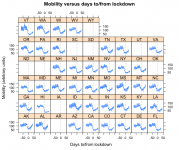Agreed that the legal issues will need to be decided in court. Empirical evidence could play a part in it depending on the judge as the question will inevitably arise of what sort of evidence is required to suspend rights.Bell206 said:To use a singular "study" to quantify a complex and currently ongoing situation does not do anyone any good. If the NYC-Tri-State transportation system was shutdown (quarantined) the 1st week in February, how would that have affected your study? Until SARS as run its initial course, no study is valid across all demographics. Same as any risk management conclusion or recommendation. Perhaps you are validating a specific point that I'm missing. But until all the data is in, validated and peer-reviewed, it's nothing more than opinion. The other side of the equation away from the medical side involves how the stay at home orders interact with the Constitution and B of R. From a legal stand point it's this route that will make it to court vs your study.
I think there is a meaningful distinction between "just opinion" and reasonable studies in preprint form. Clearly peer-reviewed is the standard (though still far from perfect) but it is possible to judge the quality of studies to a fair degree in preprint form. And a serious scholar going to the trouble of writing something up and posting it publicly with their name attached is better than "just opinion". Unfortunately Reilly's study is the only one to look at empirical data on this question so far. I am actually surprised that is the case as I would think that epidemiologists would be all over it. A bunch of modeling studies but I imagine we might agree on the limitations of those in inferring causality.
So based on the data which is presently available I think it is fair to say that a preponderance suggests that at least in the US coercive lockdowns have not decreased Covid-19 deaths or slowed their growth.
Of course that may need revision based on further data and analysis. I would be pleasantly surprised if such future studies arrive, but I do wonder if they will. I have not been able to find such a study of SARS or MERs. Maybe this time will be different as you suggest -- I hope so.
Sadly I think public policy is often driven primarily by things other than facts and analysis. And certainly in the case of Covid-19 the government made recommendations based on little to no actual data. I am not aware of any formal cost-benefit or risk analysis for the lockdown which were performed in the state of Arizona before the order came out. And Ioannidis at Stanford warned that politicians were making decisions based on inadequate information.
And fun about don't assume people are pilots

